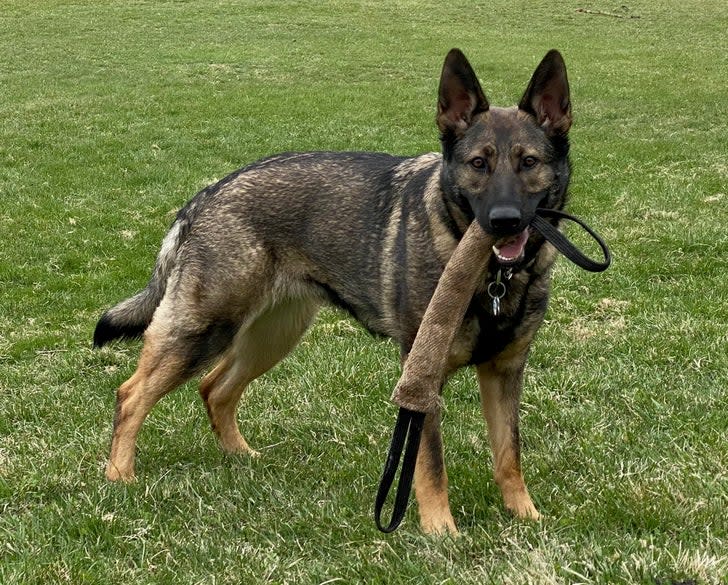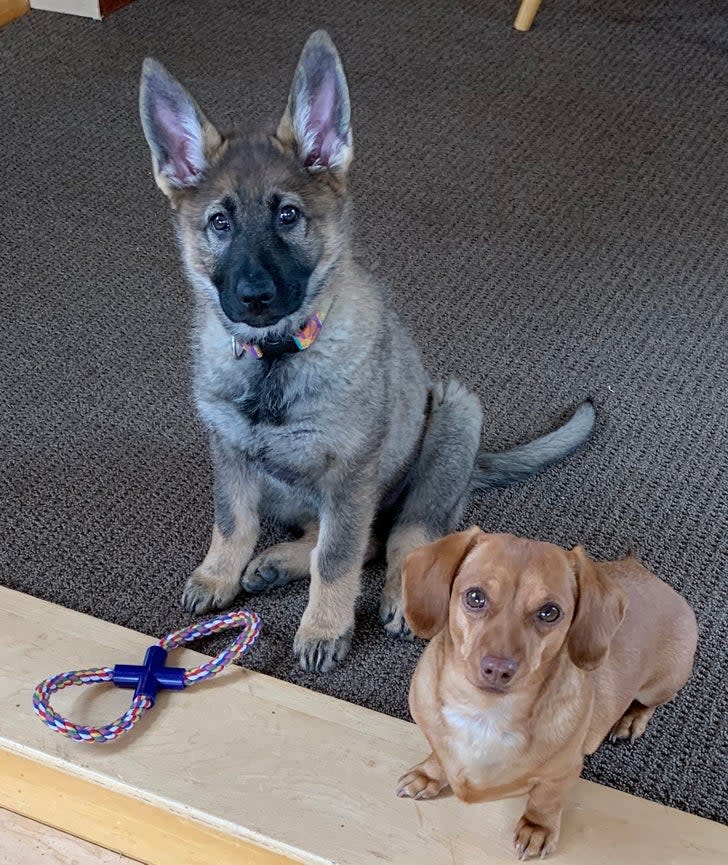Unleashing the Secrets of Search and Rescue (SAR) Dog Training
This article originally appeared on Backpacker
Out Alive is a podcast about real people who survived the unsurvivable. Check out more seasons and episodes here.
We are excited to announce our new monthly series, Survival Shorts from Out Alive. In these episodes, we delve deeper into the world of survival with expert advice, fascinating inquiries, and conversations with rescue professionals. Our aim is to provide you with an informative, thought-provoking, and engaging understanding of the challenges and complexities of survival in the backcountry.
Join us as we sit down with Jeff, a search and rescue dog trainer and handler, to explore the world of canine search and rescue. Jeff will share his personal experiences working alongside his dog, Kismet, and provide insight into the unique bond that develops between a handler and their furry companion.
In this episode, we’ll dive into the nitty-gritty of the rigorous training process for SAR dogs and learn about the specialized skills and abilities that make them such a vital part of search and rescue operations. From tracking scents to navigating tricky terrain, these highly trained pups are always up for the task.





Transcript
Host: Out Alive is made possible by Outside+ subscribers. iOS users can now explore content for more than 30 publications in the Outside+ app. Browse gear reviews, training plans, travel guides, videos, and the survival stories you love. Download the Outside+ app now from the App Store and use your Outside+ login to get started. Outside+, the one subscription to fuel all your adventures.
Welcome to our survival short series from Out Alive. Alongside the harrowing stories you love, we’re introducing biweekly minisodes for twice the listening. In this special series, we get to dive deeper into the world of survival with more expert advice, fascinating inquiries, and conversations with rescue professionals.
In today’s Survival Short, we’ll take an inside look into the world of some of the most hardworking and indispensable members of certain rescue teams.
The relationship between dogs and humans predates modern language and history. Drawings in caves of humans with dogs coexisting and even herding sheep dates back nearly 10,000 years ago.
And while every pet owner thinks of their furriest family member as special, some dogs are bred and trained as actual heroes. Search and rescue dogs and their canine handlers are called to duty when humans face threats from avalanches, natural disasters, and to track people lost in the wilderness.
Jeff Liddle: My dog is named Kismet. She is a full-blooded registered German Shepherd dog. She comes from a kennel in Missouri, and they breed working-line German Shepherds. So those dogs are bred to work in all sorts of different disciplines, not just search and rescue, but I got her specifically for search and rescue. She’s three years old now, super sweet, really good with people, and just loves to work. She gets up every day ready to go and will drive you crazy if you don’t work her.
Host: Meet Jeff Little. Jeff has been working in outdoor education for over 40 years as an educator and administrator. He started working with dogs in different capacities when he was just a kid.
Jeff Liddle: I grew up in western Pennsylvania and my grandfather raised hunting dogs and competed in field trials. So I’ve grown up around working dogs and did some dog sledding in Minnesota as part of an outdoor program that I worked with up there. In the early '90s, I started getting really interested in search and rescue dogs.
The thing that I think really draws me into it is really the relationship that you have with a working animal. It’s unlike anything else that I’ve ever done, and so that piece from my childhood has always stuck with me, and now I’m fortunate to have the time to really put into it.
Host: Certain rescue dogs aren’t like your average pet dogs. They are specially bred and meticulously trained for stamina and to track and locate missing persons. Dogs are also social learners and unique in their abilities to work with and read human emotions, which is an important component of this sensitive work.
Jeff Liddle: The first thing that I think is really important to understand about working search dogs is that they have to have a motivation to do the work, or what is known as drive.
So a dog has to be really excited and motivated to find things. And that’s a natural part of their survival. But some dogs, like pet dogs, are a little less driven than working dogs for good reason. You don’t wanna have a pet dog that drives you crazy, but a working dog will just obsess about finding things.
You’re basically channeling that energy through the training process. And so the dog works for a paycheck, really just looking and looking for something, and they won’t stop looking until they find it. So we have to get them to be clear on the particular expectations that we want, which is to find a human being, and then get a paycheck or a reward, which for many dogs is a toy, and for some dogs is food.
So some will work for food, some will work for a toy, some will work for both. So the dog learns through a sequence of ever-increasing complexity of finding human beings in various contexts.
Host: Jeff is clear that while having a certain rescue dog is rewarding, it’s a full-time job. A job with no pay, no vacation, and that requires significant time and financial investment. Search and rescue dogs and their handlers train two to five days a week to make sure that when a call comes in, they’re ready to answer.
Jeff Liddle: My dog lives with me. She’s part of the family and she does stuff with us, but there are certain things that she can’t do that my pet dog can get away with. She has to live a much more disciplined life, so our pet dog can go outside and we can laugh at her.
She’s a miniature dachshund and she can chase chipmunks and bark at squirrels and do all kinds of things like that, but my working dog cannot do that. She can’t lose her focus on those kinds of things because if we’re out in the field and we’re working, and she starts trailing a rabbit instead of the person we’re looking for, then that’s gonna be a real problem.
She also needs to work a lot. Pet dogs, not all pet dogs, but some will be content to go on a walk around the block and hang out around the house and do that kind of thing, whereas a working dog can be a real handful. Those drives that I’ve talked about before about you want the dog to be kind of crazy about finding things, if that’s not channeled, they’ll eat your couch. They’ll destroy your house, they’ll get up on the table and eat the bread that you just put out of the oven. Like they can be kind of a handful. You have to kind of keep them really engaged and working. I can’t leave her with anybody. I can’t just say, "I’m gonna go out of town for a week. And a friend of mine who has a pet dog is gonna have her come over there and hang out."
If she were to get out or get hurt or anything like that, that’s a significant investment. Thousands of hours of training that just went down the drain, and so you have to be really careful about that. You have to have a fitness program for them so that they can work effectively.
They’re like elite athletes. I don’t know if people really understand the fact that we’re volunteers. A lot of times people will see us out on searches, and we’ll be with law enforcement officers and people think we're part of the police department, and we’re paid and we get financial support for this. We don’t, and it’s a tremendously expensive endeavor to volunteer and be a canine handler.
Host: Jeff lives and works in Colorado where the county sheriffs oversee any missing person operation. It’s the sheriff’s office that makes the call if the situation warrants calling in certain rescue dogs. Most times there are multiple teams working in concert together with other search and rescue ground and air personnel, and communication is key.
Just like a college student chooses a major, search and rescue dogs specialize in specific disciplines and are trained to work in a specific environment. Here’s Jeff to explain.
Jeff Liddle: So your dog will specialize in one, or sometimes many, disciplines. Sometimes they’re trying to find a specific person. They get what’s called a scent article, so a piece of clothing that person wore.
The dog smells it. They will trail that person by smelling the ground, and that’s a trailing or tracking dog. Or they might smell that scent article and run around in a big, large, open area. And those dogs are smelling for the air as opposed to the ground. And those are air scenting dogs.
There are dogs that work in disaster environments. Disaster is a really specific niche and the dogs have to be just beyond fearless. There are water search dogs who will stand on the front of a boat and smell the water and they can find, locate where a body might have been submerged in a drowning. There are avalanche dogs. In an avalanche, time is of the essence, and so as soon as there’s an avalanche, those dogs get on a helicopter and they’ll fly them around the state.
Host: What makes certain rescue dogs critical, of course, is their sense of smell. Humans rely mainly on vision to search and in difficult terrain, victims can be easily missed. Dogs can have over 300 million scent receptors compared to humans, 6 million, and their nose knows. That means a dog is capable of smelling and locating one rotten apple in a barrel of two million apples.
A well-trained certain rescue dog is capable of sorting individual odors and can track a single scent for miles. One study found that dogs can search the same area as 50 humans in a fraction of the time.
Jeff Liddle: Their olfactory system is estimated to be somewhere between 10,000 and 100,000 times more acute than a human being's.
And so every day when she goes out and finds something, I just can’t believe it. It’s always a surprise when we’re on a real mission and we’re searching and you don’t know where the person is. The amount of trust you have to put in that dog that we’re going the right way is almost hard to explain because I can’t ask her.
I can’t say, "Are you sure we’re going the right direction?" And sometimes it’s through some really challenging environments and I’m thinking, "Holy cow, what are we doing here?" They do pretty well in training, but on a real mission, when they find somebody, even though you believe in them, it’s always like, "Whoa, there’s the person."
Host: In order to have a scent to follow, teams like Jeff and Kismet are sometimes sent to the individual’s home in order to gather a scent article the dogs can use for tracking.
Jeff Liddle: There have been different times where I’ve gone into a house and one of the things we need to make sure of is that that scent article has not been in contact with anybody else’s scent in that house.
One of the ways that we do that is you can get insoles out of people’s shoes. And so you start to get really kind of involved in someone’s life in a way inadvertently because you’re in their home. They’re looking at you with such hope that their loved one can be found and can be found alive. And so you’re bending over to pull an insole out of a shoe. More often than not, there’s a picture of the family in the hallway where you see the person that’s missing, you’re in this context where it’s such a vulnerable situation for the individuals and you can’t help but be impacted by that. You collect that scent article, you go back out into the field and you start searching, but you carry with that this sense of responsibility to be as helpful as you can.
Host: And of course, there’s that moment when all that training pays off.
Jeff Liddle: One of the most powerful things that happens on a search as all this communication is happening and nobody knows where the person is and nobody knows if the person is okay or not. There’s a moment in all this radio chatter where something will come across the radio where everybody is asked to be quiet and someone will say, "We’ve located the subject," and universally the sigh of relief, the cheering, the hugs of everybody that’s involved in that search is just really powerful, and the dogs seem to know as well.
It doesn’t always end like that. We have been on some searches where we have found someone who was not fortunate enough to live through the circumstance of their situation in the field.
Those are very somber and tragic situations as well. And the dogs seem to sense that too. It’s such a mixed feeling, especially if your dog finds someone and they’re deceased, that you’re very happy that you dog did their work, and you can reunite the family with this individual who’s been missing, but at the same time, it’s such a tragic outcome, and so we have to pay attention to our dogs, and that affects different dogs differently. Some dogs seem like they take that on a little bit, whether we’re finding somebody who’s alive or someone who hasn’t made it through the situation. Either way, it’s just full of a lot of emotion.
Host: You can see photos of Jeff, Kismet, and her pet miniature dachshund sidekick on our website at backpacker.com/outalive.
And if you wanna support the work, Jeff, Kismet, and other search and rescue canine teams do visit sardogsus.org or larimercountysar.org. This episode of Survival Shorts from Out Alive was produced and written by me, Louisa Albanese, with production and editing by Zoe Gates. Sound Design and scoring was by Jason Patton.
Do you have a story or burning survival question you want us to answer? You can email me at outalive@outsideinc.com. Thanks for listening, and if you enjoy Out Alive, you can help us by following the show and leaving us a review.
For exclusive access to all of our fitness, gear, adventure, and travel stories, plus discounts on trips, events, and gear, sign up for Outside+ today.

